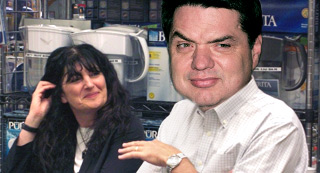On Tuesday, Zabar's, the über-grocery store on Manhattan's Upper West Side, hosted the Symphony Space launch of the "Food Fictions" edition of its Selected Shorts ("A Celebration of The Short Story"). Actor Tony Roberts read a portion of T.C. Boyle's "Sorry Fugu," a short about the love-hate relationships that develop between chefs and restaurant critics. On-hand to talk about the nonfiction realities of that relationship were former New York Times restaurant critic (and, ahem, my boss), Ruth Reichl, and current restaurant critic for New York magazine, Adam Platt. (We were allowed to take pictures of Mr. Platt, but we are going to honor his request that we don't show pictures of Mr. Platt, in order to help him maintain a level of anonymity. We promise, though, that he doesn't really look all that much like his brother, Oliver—no matter what the photo above might have you believe.) But what advice did these two eaters-extraordinaire have for the budding Mimi Sheratons out there?

First, it seems that being friends with a restaurant critic might be a better gig than actually being a restaurant critic. You get to enjoy all the perks without that nagging feeling that having a job to do brings with it. But if you are lucky enough to find yourself in such a situation, both Adam and Ruth have advice for you: shut up.
Reichl: "Friends want to help as much as they can, so they try to offer advice."
Platt: "They're feeding you quotes, when really all you want are bodies."
Reichl: "You just want people there so you can order as many different things as possible. All the comments and opinions just get in the way of the job you have to do."
Secondly, for all you kids in culinary school who think that you're on the road to a life of getting paid to write about your educated eating, Adam's background was strictly in journalism before he started on the restaurant beat with "no food background to speak of," and Ruth's feeling is that "it's more important to have a great writer than a great chef when you're looking for potential critics." So drop the knives and break out those J-school apps! And, once you've made it, you have to do your best to avoid going to places when they first open, because it won't be indicative of the restaurant's true self. In fact, it'll be too enjoyable: Ruth's sense is that there must be a nomadic clan of servers, traveling from restaurant opening to restaurant opening, offering impeccable service for the first few months of a restaurant's life, impressing diners (and critics), only to vanish when their time is up, leaving behind a far more mediocre crew. If you do find yourself in a brand-new place, Ruth's other hint is that you should always—always!—order the steak. After all, this is when the beef purveyors are trying to woo the restaurant's business, so they offer up beef of extraordinary quality during this courtship. After a few months, the super beef disappears with the nomad waiters. But most importantly, when you're stuck at a restaurant you're thinking of giving three stars to, eating great-but-not-transcendent steak, thinking about how the service was better when you were eating there a month ago, just try to muscle your way through it and to keep telling yourself: It's a tough job, but somebody has to do it.



 Pinterest
Pinterest


